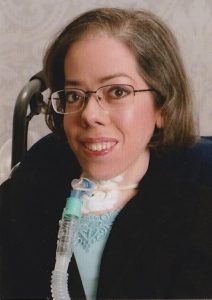
By Michelle Brose
Though Charcot-Marie-Tooth is rarely fatal, respiratory complications are one of the ways it’s possible to die from CMT. Breathing requires the coordinated movement of several muscle groups; the diaphragm and abdominal muscles, the intercostal muscles that expand your rib cage, and even the bulbar muscles in your neck. It’s possible for Charcot-Marie-Tooth to cause damage to the nerves that power these muscles, resulting in weakness, atrophy, and respiratory insufficiency. But the symptoms of respiratory problems in people with neuropathy aren’t well known, even among doctors. It’s usually more subtle than simply feeling short of breath, so people often attribute
their symptoms to other causes.
Hypercapnia
The first sign of breathing problems in CMT usually isn’t shortness of breath; it’s hypercapnia, the retention of carbon dioxide. The symptoms generally begin to be noticeable at night, because your weakened diaphragm is being pressed on by the contents of your abdomen and your chest can’t expand fully while lying flat. When you’re breathing shallowly at night, the carbon dioxide in your lungs isn’t being exhaled completely, and it begins to build up in your blood. Symptoms include headaches, fatigue, difficulty concentrating or staying awake during the day, and restless sleep. You may have anxiety when lying flat, nightmares, or unusually vivid dreams from your REM sleep being interrupted.
During the day, you might have difficulty making yourself heard when speaking, or find that your sentences are trailing off because you have to take a breath in the middle of them. You may also catch yourself using your shoulder and neck muscles to help you get a breath, or notice that your diaphragm is retracting with the effort to breathe.
If the carbon dioxide buildup isn’t stopped, you may experience an altered mental state. You may become confused, and have others tell you you’re not making sense when you speak. You may “black out”; your brain temporarily losing the ability to form short-term memories. You might even lose consciousness. In a serious respiratory crisis like this, emergency room doctors may decide to perform a tracheostomy and put you on a ventilator.
If you’re experiencing any of the above symptoms, you can avoid a crisis by using a BiPap machine with a facemask at night. It will assist your natural breathing by helping you take deeper breaths while you sleep, which will exhale the excess carbon dioxide. You’ll wake up feeling refreshed, with more energy to breathe deeply during the day.
People with more severe forms of CMT may eventually find that they need ventilatory support in the day-time as well. That can also be provided noninvasively, with either a facemask or a mouthpiece, for people who wish to avoid a tracheostomy tube.
Weak cough
When the respiratory muscles are too weak to provide an effective cough, mucus can build up in the lungs, trapping bacteria and preventing oxygen from getting in. To prevent pneumonia, you could use an “assisted coughing” method like having somebody push up sharply on your diaphragm while you cough. There are also postural drainage techniques that can make it easier to dislodge and cough up mucus, by raising your hips above your head and shoulders when you’re lying down. The most effective way of clearing your lungs is a noninvasive machine called the Cough Assist; it inflates your lungs via facemask or trach tube, then pulls it and the mucus out again.
What’s wrong with getting extra oxygen?
When you get supplemental oxygen, the higher levels of O2 in your blood trick the respiratory center in your brain into thinking that you’re breathing more deeply than you really are. Your brain decides it’s safe to take it easy and put less effort into breathing. Extra carbon dioxide will quickly build up to dangerous levels, eventually overwhelming the oxygen being carried by your blood. In extreme cases, you could suffocate, and require emergency intubation and invasive ventilation. Dr. John Bach, who literally wrote the book on pulmonary rehabilitation, often says that “Giving oxygen [to patients with neuromuscular diseases] is like applying a Band-Aid to cancer.”
What can I do to prevent respiratory complications?
It’s important to be proactive when it comes to your breathing. If you delay getting care for breathing problems, you may put yourself at risk for a respiratory crisis or pneumonia. The first thing to do is get a baseline pulmonary function test from a pulmonologist who’s been trained in how to manage patients with neuromuscular diseases. Not all of them understand our unique needs, so it’s best to get a recommendation from an HNF Center of Excellence. Follow up on this regularly (about once a year) to check for any changes or decline.
Part of the test is checking your carbon dioxide levels. This can be done one of two ways; either by the traditional arterial blood gases (ABG) test, or by measuring the amount you exhale with a capnometer. Opinions vary as to which method is more accurate, but if you have a fear of needles, you can seek out a doctor who will use a capnometer instead.
Most importantly, always listen to your body. Don’t delay bringing up any concerns about your breathing with your doctor in hopes they’ll go away. Once your respiratory function has been addressed, you’ll always breathe easier.
Please support HNF’s TRIAD research program by making a donation today!













I wish I would’ve seen this earlier. Symptoms kept getting worse, so went to ER. I passed out there and woke up intibated (sp). Then had to make decisions in a dire situation. I have a tracheotomy and will use a BiPap at night connected to trach. Doctor says I’ll have better control than a mask. So, guess that’s a plus. Thanks for the article.
Does everyone diagnosed with CMT eventually progress to respiratory difficulty.
Great article!! I recently realized I was always running out of breath, even after simple routine tasks. So I requested a breathing test from my doctor, wich I flunked!! She prescribed an Albuterol inhaler for use up to 4xday. It does help. Also I am going to try to locate a Pulmonologist who understands CMT. Thanks for the info!!!
I have CMT and experience the same thing: running out of breath. When I mentioned this to the doctor, he did a breathing test which I flunked. So far, I am convinced that many of the specialist doctors really know very little about CMT patients who are dealing with breathing difficulties.
What treatment can be used if carbon dioxide levels are too high? What can a pulmonologist do?
The above article describes what I have been living with for several years. The past year and a half I am on oxygen 24/7. My doctors do not know why I can’t breathe, even my neurologist did not think it was the CMT. The symptoms above sound just like what I am experiencing. Please tell me what to do.
I used to sleep really well and now only 2-3 hours per night max 5. I was diagnosed with CMT 2 approx 5 years ago and 2 summers ago I was diagnosed with Diabetes Type 3c after being admitted to intensive care with blood sugar of 37 mmol – I injured my pancreas as a result of a fall due to bad balance from CMT and now it had failed. My dreams are as described in this article, extremely vivid and normally during bouts of 1 hours’ sleep at a time, perhaps twice at night and maybe once or twice during the day. I am woken quite often with hypoglycaemia awareness and also by extremely dry mouth or sometimes because of the intensity of my dreams. On waking I often feel groggy with nausea and headachey – not always because of hypo symptoms, sometimes I feel this way though my sugar is in range.
It is interesting (though frightening – frankly speaking) to know that ! One of my diaphragms is not functioning . My wife says that sometimes I make strange noises like choking while sleeping whereas l do not feel anything of that at all ! I have to
Indicate that I have asthma yet I keep swimming 3 miles a week for several years now , so I wonder if this fact stop my diaphragms deterioration .
I have CMT1a and am in the investigational medicine study at St. Louis University. In the last couple of weeks, I have been so tired that I’ve hardly been able to move. Then I started having chest tightness. I was admitted to the hospital where they checked me for blood clots. Everything is negative and I’m going back home, exactly the same as I have been. I’m wondering if it might have something to do with the CMT. I’m only 37. I shouldn’t be so fatigued.
Excellent explanation of possible breathing problems. My daughter was incorrectly diagnosed as having asthma by her pediatrician after several respiratory viruses that caused her to be admitted to the hospital. We later consulted with a pulmonologist who recognized her problems were not caused by asthma but weakened muscles due to CMT. So glad that the medical community is starting to recognize that breathing can be affected.
This is an excellent article. My late husband was diagnosed with hypoventilation and raised raised CO2 levels in 1994. He’d been experiencing terrible morning headaches, the cause of which our GP failed to diagnose. However, an article in the CMT International newsletter, sent to us by Linda Crabtree, gave us the clue we needed.
We were referred to a respiratory specialist and my husband underwent sleep tests. As a result, he was started on a BiPap ventilator, which cured the headaches straight away. The right side of his heart had been damaged by the high CO2 levels, but that had recovered completely within 18 months.
The advice given by Dr John Bach is sound advice, which we didn’t receive until later, and on one occasion, before the sleep tests, my husband was given oxygen by a junior doctor who didn’t know any better.
The good news is that my husband gained an extra ten years of life, thanks to the ventilators.